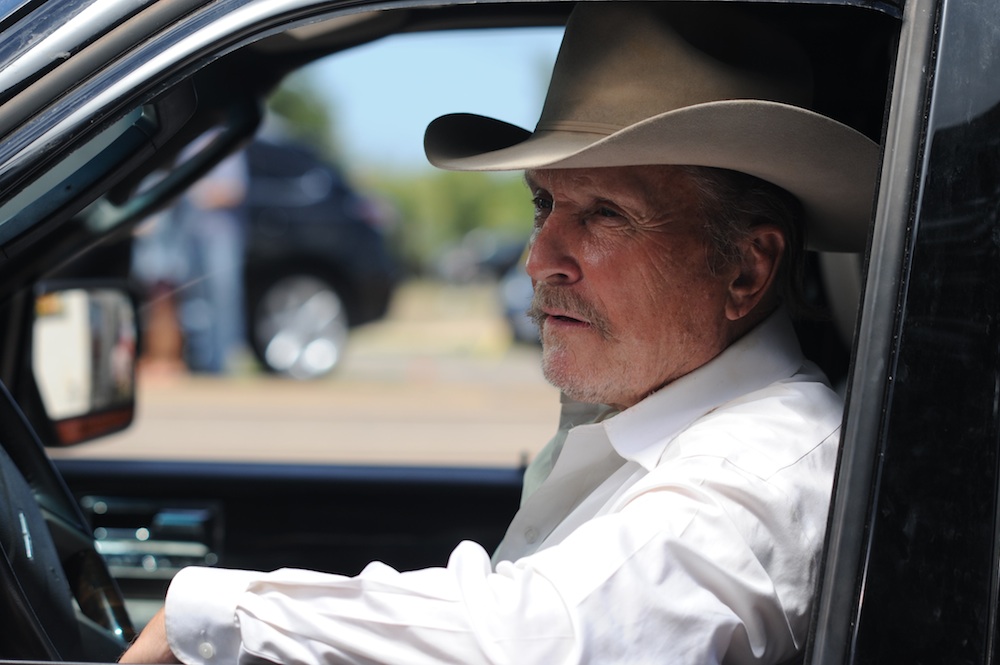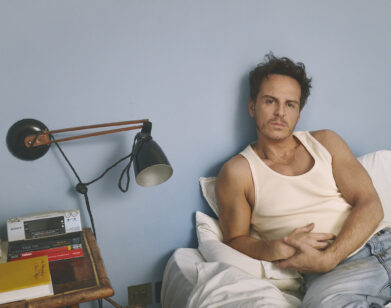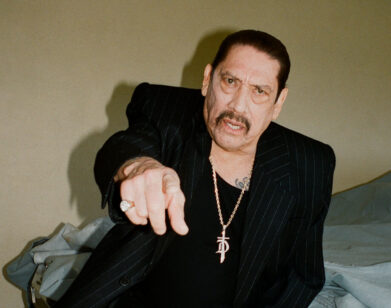An Afternoon with Robert Duvall

ABOVE: ROBERT DUVALL AS RED BOVIE IN A NIGHT IN OLD MEXICO.
“This year is as good a year as any I’ve had in years,” reflects Robert Duvall. “I have A Night in Old Mexico, and then I did a film with Robert Downey Jr. called The Judge, which will be another big movie like Apocalypse,” he continues. “Maybe the biggest since I don’t know when.”
These statements are not to be taken lightly; over the course of his 60-plus year career, Duvall has been nominated for six Academy Awards and has acted in some of the most iconic films of the 20th century (The Godfather, Apocalypse Now, To Kill a Mockingbird). The definition of a character actor, he’s played everyone from Doctor Watson and Boo Radley to newspaper tycoon Joseph Pulitzer, a Napalm-loving Vietnam lieutenant colonel, a dancing Cuban barber, a Pentecostal preacher, and a harlequin clown with a penchant for Stravinsky (his first role on the stage). Now 83, Duvall says that Joseph Stalin, whom he portrayed in a 1992 television biopic, was the role he felt the least qualified for. “When I went over there, some guy said to me, ‘When you play Stalin, you must remember the East,'” he recalls. “And that meant nothing to me, but then it began to mean something to me. Poison. People. Paranoia. Potions. Murder.”
Today. Duvall’s first film of 2014, A Night in Old Mexico, comes out on VoD and in limited release. Duvall plays a genre of character he’s familiar with—a lonely, cantankerous Texas rancher named Red Bovie. When the film begins, Red has just lost his ranch and is on the brink of losing his independence. Much like Duvall himself, Red “isn’t done yet” and when his previously unknown grandson shows up on his doorstep, he decides it’s time for one last night of youthful revelry across the border. Co-starring Jeremy Irvine (the grandson) and Angie Cepeda (the love interest), the film is Duvall’s second collaboration with screenwriter William Wittliff. The pair first worked together on the 1989 miniseries Lonesome Dove, which Duvall still refers to as, “my Hamlet;” the one project after which he could have happily retired. “In Texas, they watched it in families. A woman came up to me and she said, ‘I wouldn’t let a man marry into the family until he saw Lonesome Dove,’ ” he laughs.
Unlike Red and many of his recent character, however, Duvall is charming, polite, and delightful. Interview spoke with the veteran actor early this week in New York.
EMMA BROWN: Let’s start with the basics. How did you get involved in A Night in Old Mexico?
ROBERT DUVALL: Well, Bill Wittliff—he’s a wonderful Texas writer—he’s worked on this [film] for over 30 years. He’s very much a perfectionist—difficult for some people to work with. Dennis Hopper was going to direct it for a while, and then a French guy got a hold of it, and then, finally, Emilio Aragón from Spain loved the script, had money, brought his expertise and his crew, and we did it in Southeast Texas, in the Rio Grande Valley. It was now or never. It had been in the works for years and years and years.
BROWN: How long had you been following the script?
DUVALL: I’d been following it for a good 15 or 20 years, but it wasn’t right yet. It was a marinating period. Wittliff updated the script and made it a lot better. Right up until the week before [filming], the powers that be were going to pull the plug and say “We’re not going to make the movie.”
BROWN: Oh, wow.
DUVALL: So I had my friend who was producing say, “If you pull the plug, this’ll be more disappointing to Bobby’s feelings than Red Bovine losing his ranch in the movie.” The guy said, “Oh, I get it. We’ll go ahead with this.”
BROWN: What made this project so special—what made you keep coming back to it?
DUVALL: I think it started with that character. It was almost like a descendant of those two guys from Lonesome Dove. I’ve always wanted to play the character, Red Bovie. [laughs] He was definitely a character. I didn’t have to do a lot of research; I just let it come. That’s the way I did it with Lonesome Dove. I went around Texas talking with people, meeting ranchers. Stop and get some good barbeque here; hear a good country band there…
BROWN: Do you like to dance?
DUVALL: Yeah. I dance the two-step. You don’t take it to the point of the experts, but you dance it in a nice, social way. When I do a movie like that, or any movie—a western, too—I like to do my own dancing, my own singing if I have to, my own horsemanship. My favorite two sports are American football and show jumping. You guys [the English] are probably the top jumping riders in the world today. A lot of our guys become cowboys instead of that, but I’ve always liked it. I’d need to have a bomb-proof horse. You know what that means?
BROWN: One that won’t bolt no matter what.
DUVALL: Right! [laughs] Some people say, “What do you mean by that?” Well, it’s self-explanatory. If a bomb goes off, hopefully it won’t do anything.
BROWN: I used to ride horses in Hyde Park. They were very used to city noises—they’d be fine if a bomb went off—but if a plastic bag floated by…
DUVALL: Right. I was once on a $150,000 horse—[one] that they compete on—very calm. They let me do what I could do on it, ’cause it was bomb proof. Terrific horse. We were riding through the Virginia countryside and we came to a small canine graveyard, and that horse almost jumped out from under me. Something [must have] jumped out of the grave or something!
BROWN: When did you learn to ride?
DUVALL: Oh, just growing up, and then in California when I had a lot of free time years ago. I wanted to ride Western, but a lot of guys who ride Western are terrible horsemen. They had a place that was a great big facility, and you’d rent a horse for three, four, five dollars an hour. I’d take a horse out bareback, Western saddle, English saddle— I like English saddle—and jump a little bit. I wanted to have a good seat for movies, for Westerns, because so many actors don’t have good seats. That’s where that hobby started—to help my career. When I did Lonesome Dove, even for the stunts, I did my own riding.
BROWN: A lot of actors will say that they can ride when they can’t. Did you ever exaggerate or lie on your résumé when you first started out as an actor?
DUVALL: [laughs] It’s been a while since I’ve had a résumé. Been a while since I auditioned. One thing comes to mind: I liked to do different accents. I played Watson once in a movie and I played a Scottish accent—it’s different from the English [accent]. It’s much different; when you go to Glasgow you need a gun with floating subtitles. I did try out once for a play; it was to play of a young King Henry VIII. I got up there and did a pretty good English accent, and the director said, “Where did you learn to do that?” And then he had me do it again. I didn’t get the part, but I puzzled him a little bit!
BROWN: Jeremy Irvine is a great actor. I always assumed he was just pretty.
DUVALL: Yeah, he’s from England. He did a good American accent.
BROWN: I just saw him in The Railway Man—
DUVALL: Oh, is Jeremy in that? I bet that’s a nice movie.
BROWN: It is.
DUVALL: That’s what I hear. Jeremy plays a soldier?
BROWN: Yes. He plays a younger version of Colin Firth’s character.
DUVALL: Great, that’s nice. He’s nice to work with. He loves Southeast Texas. He got on the mechanical bull—we told him you can’t do that ’til the movie’s over. [laughs] You might get hurt! But he was great to work with. Angie Cepeda was terrific to work with; she’s from Colombia. Interesting young lady. Her mother used to be a prosecuting attorney. She’d sit behind curtains when she prosecuted the drug people, for protection, so they wouldn’t know who she was.
[Angie Cepeda] works in Madrid. Ed Johnston, the casting guy, found her. She had to do her own screen test in a makeshift thing and she captivated all of us. [It was a ] very good cast. I love working in Texas anyway—especially that part of Texas. Brownsville’s supposed to be the most corrupt town in Texas. The [border] wall is right there; you could touch it. The ladies brought us some cabritos, some goat, from a restaurant over in Mexico one day. Nice ladies. I said it was very good, and they said “Oh, come to our restaurant across the border,” I said “I’m not coming across.” Too dangerous around there. I have friends that are sheriffs around there, who are half Mexican, but are American citizens, and they said “Don’t cross the border.” Too dangerous.
I gotta see this film though, ’cause I hear it’s good. Colin Firth is very talented. Jeremy plays him younger? Does a nice job?
BROWN: Does a great job.
DUVALL: That’s nice. You know where I love to go in London? You know the Capital Hotel, in back of Harrods? They’ve always had a really good restaurant there. Now they’ve changed hands, and they have a chef who brings all the fish in from the West Country. We were there a year ago, Christmas, to do some publicity. It’s a really little place, you go sit for hours; I love it. I’ve always had good food in England. Cecconi’s—very good Italian food at Cecconi’s. The French still come over to see how to do roasts from the British.
BROWN: Do you remember your first trip to England?
DUVALL: Yeah! I did a play over there. I was terrible; I was so nervous. I’d never been on a plane before. I said, “This isn’t so bad,” and we weren’t even off the ground yet! [laughs] But I liked London. It was so far back—it was when [Brazilian soccer player] Pelé was a young man—18 years old. I go back sporadically, it’s a very pleasant place to go, London. A lot going on. And I like soccer a lot.
I was in Mexico [working on Lawman, 1971] when Pelé was still playing for Brazil [in the World Cup]. England were out-played and Brazil won. The crew I was working with in Mexico was British, so I came back and I knew the outcome. The director, Michael Winter, do you know that name? Bad guy. He ordered a horse killed in front of everybody. Sicko.
BROWN: Oh my goodness.
DUVALL: There are stories about him you can find.
BROWN: Was he trying to scare everyone into submission?
DUVALL: He may have, I don’t know. I heard that he ordered a car blown up in Piccadilly during rush hour, and they wouldn’t do it. He was a wacko that guy.
BROWN: Have you worked with other directors who are a bit off-the-wall like that?
DUVALL: Yeah, most of ’em. Directors say actors are difficult to work with, well, what about directors? It’s our face that goes up there; it’s only their name.
Coppola, he’s got his visions, but he waits to see what you do. I’ve worked with directors before who’ll say, “When I say action, tense up, goddamnit!” There’s a difference between tensing up and intensity. So some of the directors are a little difficult to work, for sure.
BROWN: Do you find directing more stressful than acting? I know you’ve done both.
DUVALL: I heard it was impossible to direct yourself, but I find it terrific. If I was in control, I acted better. Not that I watched all the dailies all the time, but I did it twice in a row and I loved it. I’m going to be doing it again coming up.
BROWN: Are you allowed to talk about the film?
DUVALL: Why not? [laughs] It’s just a film about the Texas rangers, and a son that’s kicked off the property for some reason. He comes back years later and there’s been a crime committed. There’s a female Texas ranger—there are only three in reality— and this lady ranger helps to solve the case.
BROWN: What’s the last film that really spoke to you?
DUVALL: [There were] certain performances. I thought the performance by Matthew McConaughey [in Dallas Buyers Club] was outstanding. I don’t know if he’ll ever be that good again. I always say people have their year, and they have their career too. Last year it was Joaquin Phoenix in The Master. [There was] Brad Pitt in Snatch. Eric Bana in Chopper. You see Chopper?
BROWN: No, I didn’t.
DUVALL: Oh, you should see that performance. I don’t know if he’ll ever be that good again.
BROWN: Are there any films you regret not doing?
DUVALL: Not really. I’ve turned some things down. They offered me the lead in Jaws. I wanted to play the other part, the one that the guy from England played, Robert Shaw, but I was too young. I had a talk with Spielberg. But I don’t feel bad that I turned down the part or the lead, ’cause I like more character parts. But there are certain parts that slipped away.
A NIGHT IN OLD MEXICO COMES OUT ON VOD AND IN SELECT THEATERS TODAY, MAY 16.






